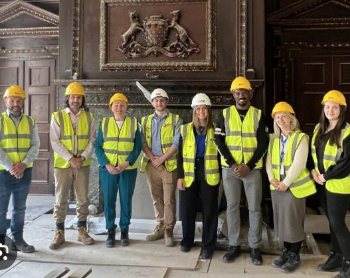Engineering services industry grapples with rising demand and skills shortage
The latest engineering services industry survey, backed by leading trade bodies ECA, BESA, SELECT and SNIPEF, has revealed that electrotechnical businesses are growing more concerned about labour shortages amid the continuing economic squeeze. While reported turnover figures indicate year on year growth, lump sum pricing, wage expectations and general inflation are negatively impacting growth.
Almost half (44%) of all survey respondents said labour shortages were their current number 1 biggest concern for their businesses – up from 42% in Q1 2023 and a third (32%) in Q4 2022. Materials shortages and fixed pricing in light of inflation were ranked second and third-biggest concerns for business-owners, respectively.
A growing number of electrotechnical businesses have vacancies in their organisations – 57% in the latest survey compared to just over half (54%) in the previous survey, taken in April 2023. Of those with vacancies, over half (54%) said they struggled with an insufficient supply of applicants to fill them.
Half (50%) said applicants lack sufficient knowledge to do the job, and half (49%) said applicants’ pay expectations were too high. Despite these findings, a significant number of contractors are expanding their directly employed workforce rather than choosing agency labour to plug the skills gap.
Rob Driscoll, ECA Director of Legal and Business, said:
“Turnover doesn’t typically reduce when inflation is high. The real test is maintaining future order books and margins. As the vast majority of survey respondents are SMEs, I am heartened to see how switched-on our Members are despite a tough business environment. ECA remains ready to help its Members mitigate the risks of an uncertain economy.
“The lack of enough skilled workers jeopardises our sector’s recovery. It leaves the industry vulnerable in an uncertain market.”
Payment times have not improved for most respondents and remain unsatisfactory. Almost two thirds of respondents (57%) said commercial clients/main contractors take 31-60 days to pay for work. A quarter (23%) said they can take up to 90 days.
For public sector work, 43% said they were paid 31 to 60 days after their projects, while one in 10 said they were paid up to 90 days after their projects.
Two thirds (66%) of respondents said that between 1 and 5% of their turnover is currently being held in retentions – a notable increase from an already worrying 53% in January 2023.
This article was issued via Pres Release as "Engineering services industry grapples with rising demand and skills shortage" dated August 23, 2023.
--ECA
[edit] Related articles on Designing Buildings
- Apprenticeships levy.
- BSRIA call for more vocational training.
- CIOB responds to skills strategy for Northern Ireland.
- Construction Industry Training Board CITB.
- Construction recruitment agency.
- Diversity and inclusion in the construction industry.
- Eight ways to win the fight for talent in construction.
- Flexible working in engineering services.
- Get ready for green jobs and upgrade projects.
- Government offers support package to help autistic people into work.
- Impact of labour shortages worsen for engineering services.
- Is social media the new way to plug the gender skills gap?
- National Infrastructure Plan for Skills.
- Net Zero not possible without right skills..
- Order books fill but skills shortages worry contractors.
- Protection for apprenticeships.
- Put electricians at the heart of the clean energy transition, says ECA.
- Skilled workforce unable to meet net zero ambitions.
- Skills shortage.
- Skills shortage and Brexit.
- Skills shortages lead to wages rise.
- Student resources.
- Tackling the construction skills shortage.
Featured articles and news
A must-attend event for the architecture industry.
Caroline Gumble to step down as CIOB CEO in 2025
After transformative tenure take on a leadership role within the engineering sector.
RIDDOR and the provisional statistics for 2023 / 2024
Work related deaths; over 50 percent from constructuon and 50 percent recorded as fall from height.
Solar PV company fined for health and safety failure
Work at height not properly planned and failure to take suitable steps to prevent a fall.
The term value when assessing the viability of developments
Consultation on the compulsory purchase process, compensation reforms and potential removal of hope value.
Trees are part of the history of how places have developed.
The increasing costs of repair and remediation
Highlighted by regulator of social housing, as acceleration plan continues.
Free topic guide on mould in buildings
The new TG 26/2024 published by BSRIA.
Greater control for LAs over private rental selective licensing
A brief explanation of changes with the NRLA response.
Practice costs for architectural technologists
Salary standards and working out what you’re worth.
The Health and Safety Executive at 50
And over 200 years of Operational Safety and Health.
Thermal imaging surveys a brief intro
Thermal Imaging of Buildings; a pocket guide BG 72/2017.
Internally insulating a historical building
An experimental DIY approach using mineral thermal lime plaster.
Tree species selection for green infrastructure: A guide for specifiers.
The future of the Grenfell Tower site
Principles, promises, recommendations and a decision expected in February 2025.























